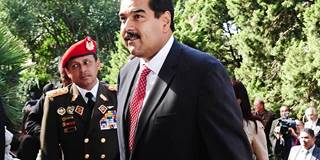The congressional elections to be held in Venezuela in December offer a flicker of hope in a country facing dark prospects. Ensuring that they are credible, however, will require the presence of reputable election observers – something that, so far, Nicolás Maduro's government has refused to allow.
WASHINGTON, DC – The congressional elections to be held in Venezuela in December offer a flicker of hope to a country facing dark prospects. Provided they are carried out correctly, they offer an institutional channel to manage the country’s deep political polarization and growing popular discontent. Given the near certainty that the opposition to President Nicolás Maduro’s Chavista regime will, at the very least, make important gains, the result could open the way for negotiations capable of correcting Venezuela’s self-destructive path.
That will not be possible, however, unless the elections are transparent and credible. In Venezuela’s volatile political climate, ensuring a fair process will require the presence of reputable international election observers – something that, so far, Maduro has refused to allow.
According to the 2005 Declaration of Principles of International Election Observations, credible monitoring requires that five criteria be met. First, the observers must be autonomous – financially and otherwise – in their relationship to the host country. Second, observers must be granted unrestricted access to all aspects and phases of the election process, as well as to all of the technologies involved. Third, observers must face no restrictions in meeting with all authorities and political actors. Fourth, observers must not be subject to any pressure or threat of retaliation by any government authority. And, fifth, observers must be free to issue public statements and reports with their findings and recommendations.

WASHINGTON, DC – The congressional elections to be held in Venezuela in December offer a flicker of hope to a country facing dark prospects. Provided they are carried out correctly, they offer an institutional channel to manage the country’s deep political polarization and growing popular discontent. Given the near certainty that the opposition to President Nicolás Maduro’s Chavista regime will, at the very least, make important gains, the result could open the way for negotiations capable of correcting Venezuela’s self-destructive path.
That will not be possible, however, unless the elections are transparent and credible. In Venezuela’s volatile political climate, ensuring a fair process will require the presence of reputable international election observers – something that, so far, Maduro has refused to allow.
According to the 2005 Declaration of Principles of International Election Observations, credible monitoring requires that five criteria be met. First, the observers must be autonomous – financially and otherwise – in their relationship to the host country. Second, observers must be granted unrestricted access to all aspects and phases of the election process, as well as to all of the technologies involved. Third, observers must face no restrictions in meeting with all authorities and political actors. Fourth, observers must not be subject to any pressure or threat of retaliation by any government authority. And, fifth, observers must be free to issue public statements and reports with their findings and recommendations.